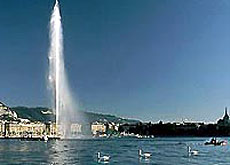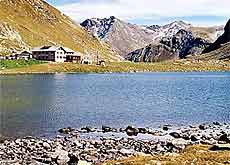Swiss keep their hands firmly on the taps

Switzerland is coming under increasing pressure from foreign multinationals and the European Union to open up its water distribution market.
But privatisation is fiercely opposed by both the public and the water industry, which say the consequences would be higher prices and poorer service.
“There is pressure from a few big water multinationals – mainly the two French companies Vivendi and Suez Lyonnaise,” says Madeleine Bolliger of the Swiss Coalition of Development Organisations, a lobby group leading a campaign to keep water public.
She told swissinfo that there is no doubt that foreign water firms are interested in tapping into the Swiss market.
“Vivendi has already opened a branch in Geneva, Suez Lyonnaise is present in Switzerland through its branch, Degremont. The French multinationals are preparing themselves and are eager to enter the Swiss water market.”
That view is shared by Anton Kilchmann, managing director of the Swiss Water and Gas Industry Association, which represents over 400 water companies. “We have an office of Vivendi here in Switzerland and that means they are also interested in doing business in our country,” he told swissinfo.
When contacted by swissinfo, Vivendi was unwilling to comment about its plans in Switzerland.
EU pressure
The European Union is also said to be actively pressurising Switzerland to open up its water market.
“There is pressure from the EU under the ongoing negotiations under the General Agreement on Trade and Services. The EU has been formally asking Switzerland to open its water services to the private sector,” said Bolliger.
The Swiss government is believed to be opposed to such a move. And the Geneva-based World Trade Organisation says that it has no rules to oblige a member state to liberalise its services.
The Water and Gas Industry Association points to the example of Britain – where privatisation brought higher prices and poorer services – as evidence that liberalising the water market is not good for the consumer.
“The reason is [that with] private organisations or private enterprises, the purpose is to make money and not to have good water supply systems in 20 or 40 years,” Kilchmann told swissinfo.
He says local water supply points – of which there are over 3,000 in Switzerland – are mostly owned by the community and this was another reason the public was against privatisation.
“There is a fear about privatisation in Switzerland because you have a loss of social control and democratic control over supply system.”
Inevitable?
The issue of private involvement in water provision is not likely to go away, both because of the global trend towards privatisation, and because of long term financing.
Hans Ruh, Emeritus Professor of Ethics at Zurich University, says the water industry is going to need substantial investment in the future, and it is far from certain that the state will be able and willing to do so.
“At some point [the government] will have to make some large investments in water and then comes the question: do we have the political power to make these investments or should we go for privatisation?” Ruh told swissinfo.
He points out that many mineral water sources are already controlled by multinationals such as Valser, which now belongs to Coca-Cola.
He says the future could lie in a combination of private and public owned water companies or in “ethical privatisation”.
Ruh says the term refers to companies who operate their core business – in this case water supply – with the good of the public and society in mind.
He adds that such firms would be owned by “ethically interested investors who on the one hand want to make a profit and on the other want to invest their money in firms that are fighting for a better world”.
Status quo
However, the general consensus seems to be that the Swiss water system works very well as it is at the moment and that water privatisation is unlikely to occur in the short-term.
“There’s a long tradition here and it is generally accepted that the water supply should be a public good,” says Ruh.
“We also have strong lobbies, the water companies in the cities have combined themselves into organisations and they are very politically active in making sure that water remains public,” he added.
Bolliger agrees there should be no change in the status quo.
“Switzerland has public water services that perform very well,” she said. “There is no reason why we should change this.”
swissinfo, Isobel Johnson
Swiss water is publicly owned.
There are about 3,000 water supply points providing over one billion cubic metres of drinking water per year.
Swiss voters rejected the privatisation of the electricity market on September 22, 2002.
The telecommunications market was liberalised in 1998 and the government is seeking to include the “last mile”.

In compliance with the JTI standards
More: SWI swissinfo.ch certified by the Journalism Trust Initiative


You can find an overview of ongoing debates with our journalists here . Please join us!
If you want to start a conversation about a topic raised in this article or want to report factual errors, email us at english@swissinfo.ch.